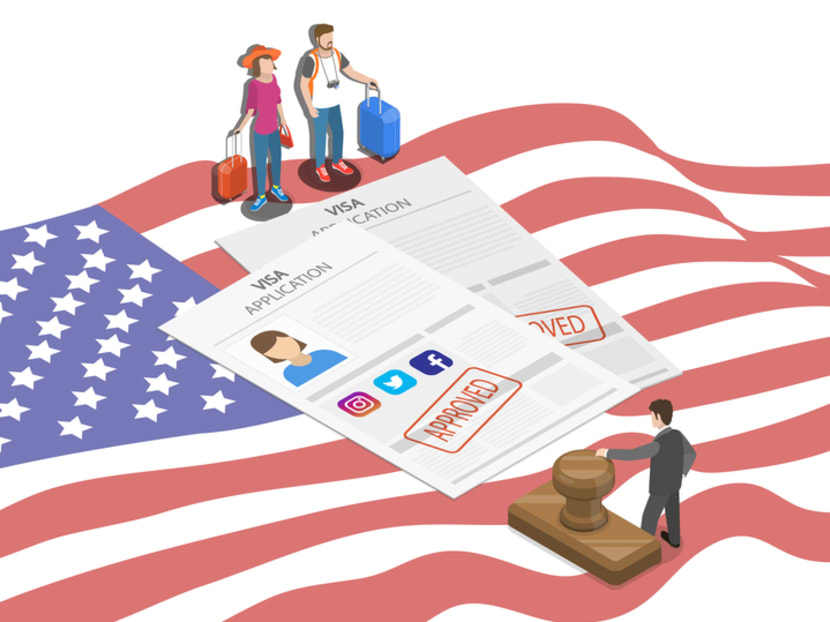Explainer: Going to study in the US? Visa applicants must now give social media account details
SINGAPORE — International travel has become more intrusive in recent years, with ever tighter security checks, for instance.
Now, the United States is requiring virtually all visa applicants to surrender details of their social media accounts over the previous five years.

The United States now requires almost all visa applicants to give details of their social media accounts. This includes Singaporeans heading to the US to study.
SINGAPORE — International travel has become more intrusive in recent years, with ever tighter security checks, for instance.
Now, the United States is requiring virtually all visa applicants to surrender details of their social media accounts over the previous five years.
Most Singaporeans heading to the US won’t be affected, as the Republic is part of the US “visa waiver programme”, so anyone travelling to the US for business or pleasure for less than 90 days does not need a visa.
But the many Singaporeans who go to the US to attend educational institutions for more than 90 days, for example, will be required to hand over their social media details.
US Embassy Singapore spokesperson Camille Dawson said, in an emailed response to TODAY’s queries: “Those Singaporeans not covered by the visa waiver programme are required to apply for travel visas and will need to provide social media identifiers.”
WHY IS THE US DOING THIS?
The State Department has a simple rationale: Protecting US citizens.
“We already request certain contact information, travel history, family member information, and previous addresses from all visa applicants,” the State Department said in a statement. “We are constantly working to find mechanisms to improve our screening processes to protect US citizens, while supporting legitimate travel to the United States.”
An administration official told The Hill website in the US: "As we’ve seen around the world in recent years, social media can be a major forum for terrorist sentiment and activity. This will be a vital tool to screen out terrorists, public safety threats, and other dangerous individuals from gaining immigration benefits and setting foot on US soil."
WHEN DOES IT TAKE EFFECT?
The new rules apply immediately, and will affect an estimated 15 million visitors to the US every year, the Associated Press reported. Both immigrant and non-immigrant visa applicants will be affected.
Until now, only visa applicants who had been singled out for extra security checks had to surrender their social media details, the AP said.
The social media account information submitted by visa applicants will give the US government access to photos, locations, dates of birth, dates of milestones and other personal data commonly shared on social media.
The only people exempted from the new rules are some diplomatic and official travellers.
WHAT IF SOMEONE LIES ABOUT THEIR SOCIAL MEDIA?
The Hill quoted an administration official as saying that if someone lied about their social media use in applying for a US visa, they could face “serious immigration consequences”.
The new policy is the result of a 2017 executive order issued by President Donald Trump calling for “extreme vetting” of foreigners visiting the US.
The wider political context is that cracking down on the possible threats posed by foreigners, both legal and illegal, has been one of Mr Trump’s major preoccupations.
WHICH SOCIAL MEDIA PLATFORMS ARE COVERED?
Pretty much all of them. Facebook, Twitter, Instagram, YouTube, Reddit and Weibo are among the mainstream platforms listed on the updated visa application process.
As part of the visa application process, travellers to the US are to submit their social media usernames, previous email addresses and phone numbers.
The US Embassy in Singapore reassures visa applicants that the social media accounts will not be monitored after the details are submitted in a visa application.
Ms Dawson said: “Consular officers would only use this information to determine the applicant’s eligibility for a visa under existing US law.’’
She added: “Consular officers will not request user passwords and will not attempt to subvert any privacy controls applicants may have implemented on these platforms.”
PRIVACY WORRIES
The new visa rules have raised significant privacy concerns among critics.
“This is a dangerous and problematic proposal, which does nothing to protect security concerns but raises significant privacy concerns and First Amendment issues for citizens and immigrants,” Hina Shamsi, the director of the American Civil Liberties Union’s National Security Project, said on Sunday, the New York Times reported. “Research shows that this kind of monitoring has chilling effects, meaning that people are less likely to speak freely and connect with each other in online communities that are now essential to modern life.”
Some experts also cast doubt on whether the new rule would have a practical impact on strengthening the national security of the US.
WHAT DOES THE NEW VISA APPLICATION LOOK LIKE?
Visa applicants will have to choose from a drop-down list of social media platforms and provide their account names that they have had within the last five years.
The full list of social media platforms is: Ask.Fm, Douban, Facebook, Flickr, Google+, Instagram, Linkedin, Myspace, Pinterest, Qzone (QQ), Reddit, Sina Weibo, Tencent Weibo, Tumblr, Twitter, Twoo, Vine, Vkontakte (VK), Youku and YouTube.
Applicants are then asked to list all social media accounts used in the past five years. They must include usernames or handles, but not passwords.
In the form, applicants are also asked: “Enter information associated with your online presence, including the types of online providers/platforms, applications and websites that you use to collaborate, share information and interact with others. List the username, handle, screen-name, or other identifiers associated with your social media profile. (You do not need to list accounts designed for use by multiple users within a business or other organisation.)”
Visa applicants are also asked to provide their previously used mobile numbers, email addresses, international travel and deportation status for the past five years. They are also asked to provide information on any family members involved in terrorist activities.






